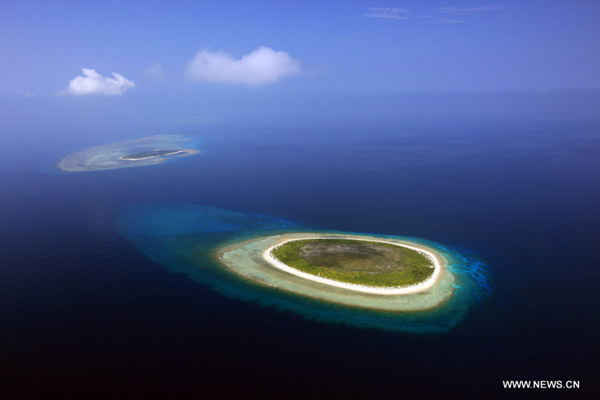
This bird eye view shows the coral reefs in China's Xisha Islands, South China Sea, June 1, 2011. [Photo/Xinhua]
By Bobby Naderi
In the latest of a series of weapons sales to Taiwan, the United States announced the sale of military drones and related equipment to the island just hours after Beijing announced sanctions on US defence contractors.
Beijing's move came after the US approved a $2.37 billion weapons deal with the island a few days before.
The weapons deals are contrary to the US' stated commitment to reduce and eventually end arms sales to Taiwan. The US administration, the hawkish US think-tankers and their media mouthpieces seem to believe that supporting the island's independence-desiring administration serves US national, economic and security interests.
This is not surprising, as Washington has an insatiable appetite for intervention in the affairs of others. Yet here is the odd thing, although the US government doesn't care about Taiwan only the US' own geopolitical interests, it is creating grave strategic risks for the US.
This is not just about weapons sales to the island, it is also about the US Navy flying the flag in the South China Sea to militarize the waters and its attempts to nurture the seeds of division that it has been trying to sow in the region.
But the politically timed and costly campaign to create regional tensions has been a failure from the start. The regional community accepts it is no longer a unipolar world.
They know that instead of working for peace and stability in the region, the US is doing the opposite as a means to curtail China's influence in the region, with potentially catastrophic consequences. They are aware that with the US Navy steeping up its "freedom of navigation" operations in the South China Sea, there is a growing risk of misunderstandings or miscalculations. And they are well aware that it is the regional countries that will inherit the subsequent disaster zone.
While the US is keeping regional countries on edge with its geopolitical games. China is promoting peace, security and commerce in the region.
It is the US that is behind the ominous developments in the Taiwan Straits and the South China Sea. China is simply trying to manage the volatile strategic environment that the US is manufacturing in its bid to contain China. The same China that the US was previously working to build deeper and more effective partnership with to advance security and commerce in the region.
By promoting peace and stability and mutual benefits, China has the winning hand in the game the US has initiated in the region. For it is the bullets and beliefs and dark-of-the-night policies of the US that are biggest threat to the region.
The author is a journalist, a guest contributor in print, radio and television, a documentary filmmaker and a member of the Writers Guild of Great Britain.

 中文
中文



